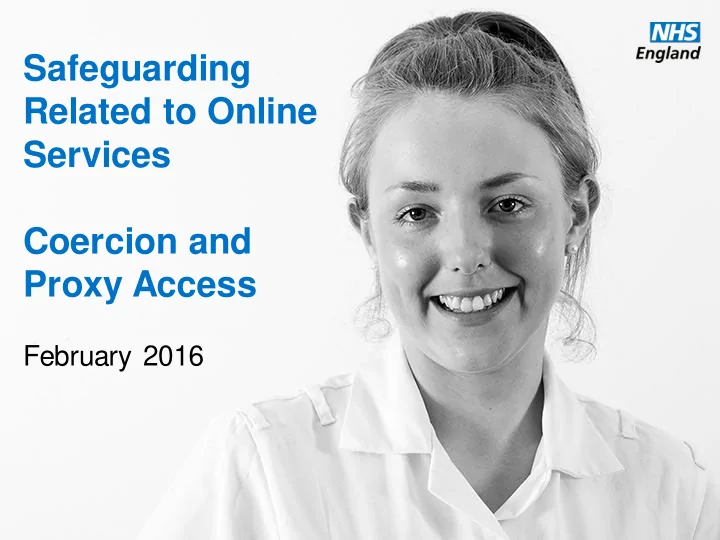

Safeguarding Related to Online Services Coercion and Proxy Access February 2016 www.england.nhs.uk
Today’s objectives Consider safeguarding concerns related to patients using online services • Coercion • Proxy access • Child proxy access • Safeguarding advice • Helpful Resources www.england.nhs.uk
Coercion Definition : “ Coercion ’ is the act of governing the actions of another by force or by threat, in order to overwhelm and compel that individual to act against their will” www.england.nhs.uk
Considering Coercion • Implication for online services By gaining access to a person’s record and abuser may gain further control or escalate harm • Does the practice policy on safeguarding need updating to cover patient online services? • Registering patients for online services requires awareness of the potential impact of coercion • The risks for coercion of patients with online access should always be borne in mind www.england.nhs.uk •
What practices should consider • Question a new patient applying for access • Check the patient’s notes for information: That may indicate previous or ingoing abuse That may lead to harm if seen by a malicious third party • If there are any indications of coercion or abuse: Consider refusing online access Data redaction or restricted access may allow safe access www.england.nhs.uk 5
Explanation to patients • If access is refused or restricted or data redacted, record it in the patient’s notes and and explain it to patient • Offer the patient an appointment with the GP to discuss the decision • The GP would explain why they consider it is in the patients’ best interests not to have access, or to have restricted access. • Patients should be involved in this decision provided they can understand the risks and are not being coerced • Discuss giving the other person formal proxy access www.england.nhs.uk 6
Proxy Access Definition : “Proxy - a person authorized to act on behalf of another or the authority to represent someone else” www.england.nhs.uk 7
Proxy access • Someone who has proxy access normally does so with the informed consent of the patient Formal proxy access – the proxy has their own second set of login details Informal proxy access – the patient shares their login details with another person • The practice may refuse or withdraw formal proxy access, if they judge that it is in the patient’s best interests to do so • Formal proxy access may be restricted to less access than the patient has, e.g. appointments and repeat prescriptions only www.england.nhs.uk
Proxy access – without consent • Practice may authorise proxy access without the patient's consent when: the patient does not have capacity to make a decision on giving proxy access the applicant has a lasting power of attorney (welfare) the applicant is acting as a Court Appointed Deputy on behalf of the patient the GP considers it to be in the patient’s best interest • The person authorising access has responsibility to ensure that the level of access enabled is appropriate for the performance of the applicant’s duties www.england.nhs.uk
Proxy access – procedure • Establish: proxy access is justified – consent or best interests level of access the proxy should have • Verify the identity of the patient requesting proxy access AND individual who will be proxy • The patient must complete the proxy access consent form • Check the record for data that should be redacted • Record in the patient’s notes: identity of the practice person authorising access level of access given to the proxy www.england.nhs.uk
Child Proxy Access Milestones 11 th and 16 th birthdays www.england.nhs.uk
Child proxy access • For most families parental proxy access on behalf of their children under 12 is appropriate and helpful • Between their 11 th and 16 th birthday most children will become competent to make the decision about whether anyone should have proxy access for them • People aged 16 or above are assumed to be competent to make an independent and informed decision • Practice systems should automatically switch off proxy access at the 11 th birthday • Case-by-case decisions about proxy access can be made later www.england.nhs.uk
Child proxy access – procedure • Verify the identity of the person asking for proxy access • Establish that they have parental responsibility for the child • Check the record and/or practice team knowledge of risk of abuse • Refuse access if there is doubt about the safety of the decision • Continue to have a high level of suspicion of abuse where child proxy access has been enabled • Consider redacting any data that may suggest a suspicion of abuse www.england.nhs.uk
Help and Support www.england.nhs.uk
Where to get help and support? • System suppliers • RCGP: guidance, practical tools and e-learning modules • NHS England national support centre: Case studies Frequently asked questions Contact details for Implementation Leads and Digital Clinical Champions Materials for patients Email help line www.england.nhs.uk
Links • https://www.england.nhs.uk/patient-online • http://elearning.rcgp.org.uk/patientonline • Email: england.patient-online@nhs.net Direct link to resource guide https://www.england.nhs.uk/wp- content/uploads/2015/11/po-support- resources-guide.pdf www.england.nhs.uk
Recommend
More recommend